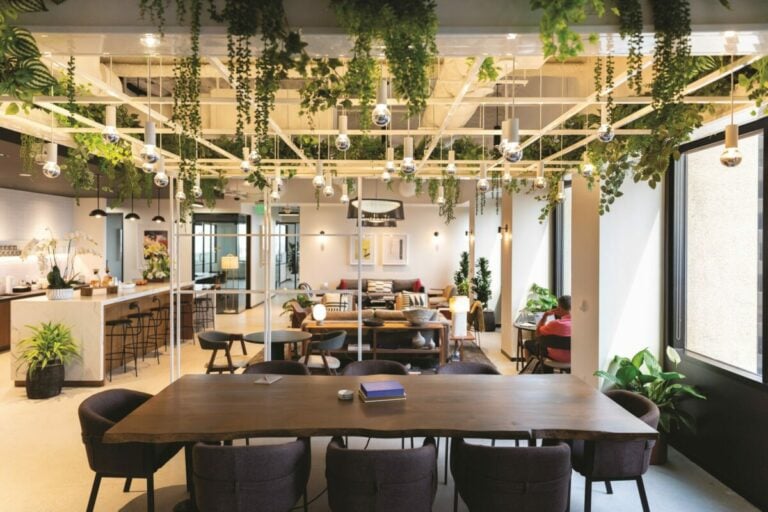
Since 2020, four of the top five coworking providers in L.A. have given back 1 million square feet of space in the market, according to Raise Commercial Real Estate.
The brokerage found that coworking accounts for roughly 5 million square feet, or 2.2%, of L.A.’s total office inventory.
“Even at the height of coworking, and yes some of them grew very quickly, as a whole they didn’t really make up more than 3% of the total L.A. office inventory,” said Petra Durnin, head of market analytics at Raise.
Despite some coworking space being given back, experts agree that the spaces that remain are seeing increased interest from companies looking for flexibility and some operators are starting to open new locations.
“The inventory has reduced dramatically,” John Eichler, a principal at Avison Young Inc. said, adding that “those remaining are doing better than they were pre-Covid.”
“I don’t believe there has been any material shift post-Covid away from leasing and to coworking. But in the early parts of the pandemic, in 2020, especially the first six months, there were many companies that canceled long-term traditional leases and put them on hold or went into coworking on a temporary basis. But since that has happened, companies have decided ‘we’re going to a virtual model’ or recommitted themselves to a smaller footprint.”
David Smith, the global head of occupier research at Cushman & Wakefield Inc., said some companies “rightsized” their portfolios in the pandemic with “underperforming sites closing.”
Occupancy at the locations still open, he said, is strong.

“We saw a pause in demand early in the pandemic. What has happened is that demand has started to pick up and we are seeing that in the market. There has been a heavy movement toward enterprise clients, which are larger occupiers utilizing flexible office as a solution right now. That can be for overflow space or for people to drop down in a city who aren’t coming into an office every day,” Smith said.
“The demand has picked up at a faster pace than traditional office demand,” he added.
Chris Penrose, a senior vice president at CBRE Group Inc., said demand for office space, especially coworking space, has increased dramatically in the last 45 days.
“Companies are figuring out that they need some sort of touch down space, some sort of meeting place and it (coworking) is the most convenient and the path of least resistance,” Penrose said. He added that it was seen as an easy option because there is no build-out time and costs, you can occupy quickly and there are no long lease negotiations or long-term lease commitments.
“Coworking is an easy way to plant a flag and grow a footprint with maximum flexibility,” Penrose said.
Private office space
WeWork Cos. Inc. has given back some office space in L.A. during the pandemic but also has worked on expanding its WeWork Growth Campus program, pledging $35 million to the program in March.
It first launched in the U.S. in New York in February, offering space and support for startups and nonprofits. It has since added locations in cities including L.A. at 222 Pacific Coast Highway and 1601 Vine St.
Chris Ferzli, global head of public affairs at WeWork, said the program allowed tech startups that were in the same space to network and grow together. The program will have 160 private offices for companies in L.A.
Los Angeles, she said, is “home base” for a lot of companies.
WeWork is hoping to expand the program to more locations in L.A.
Ferzli said WeWork is working at all its locations to “optimize and refine them and offer amenities” appealing to today’s tenants.

Private office space within coworking spaces, experts agree, is becoming more popular.
“The bulk of the demand post-pandemic over the last year has been more on the dedicated office side (within coworking spaces), companies that have 50 employees and need a place for them to sit,” Smith said.
Eichler added that concepts like Regus, which is owned by IWG and has some private offices, “weathered the storm” better than some other coworking operators.
Future
Experts expect coworking to be in high demand going forward.
“For the foreseeable future, coworking is going to be very sought after,” Penrose said. “It wouldn’t surprise me if companies looking to move their offices within their specific market want to be closer to a coworking floor or space to help with the flexibility of growth because there’s still a lot of uncertainty on what the future of office space will look like.”
He added that companies that dumped a lot of office space during the pandemic could use coworking spaces as a way to grow.
And going forward, experts think there will continue to be coworking spaces owned and run by a building’s landlord, or by a company with a management agreement in place, instead of just traditional coworking providers as seen a few years back.
A move toward more of these spaces happened pre-pandemic and is expected to continue.
“Investors and landlords are more creative with how they’re thinking about flexible office,” Smith said. “In some cases, they are starting their own brands where they offer flexible offices in their buildings. … Other times they will partner with a provider.”
Smith added that the space is also seen as a way to ramp up or down a business and “landlords see flexible office space as part of their strategy for what it offers them directly and that it acts as an amenity to their tenants. … It brings revenue to the building and is a perk to their existing tenant base.”
Experts agree that while some niche coworking companies had to close during the pandemic, some are expected to open with childcare offerings and the ones that cater to the film and TV industry will see the most demand.
And traditional operators will likely expand too.
“Coworking spaces worldwide are expected to more than double in the next two years. Companies are really utilizing flex space,” Durnin said. “Coworking has moved out of being the thing you had to go to if you couldn’t get into an office and now it’s a choice.”
